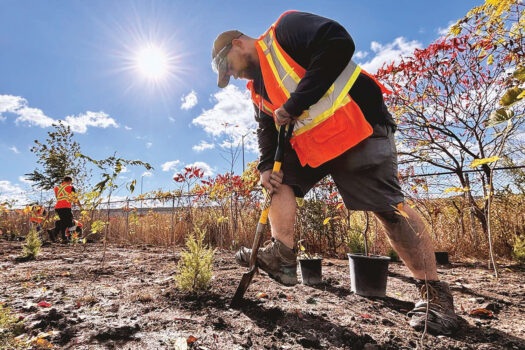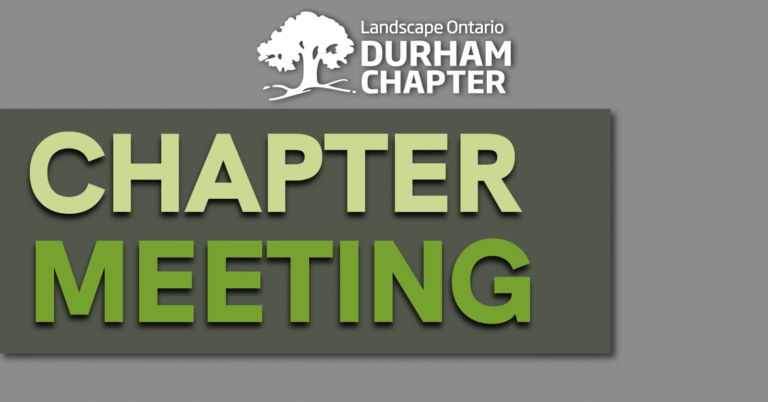LO Executive Director
 The long-awaited regulations for the Cosmetic Pesticide Ban have finally been published (www.ebr.gov.on.ca registry number 010-5080) and the news is not good for many of our members, employees and their families. The regulations are aggressive, extreme, unfair, insensitive and illogical.
The long-awaited regulations for the Cosmetic Pesticide Ban have finally been published (www.ebr.gov.on.ca registry number 010-5080) and the news is not good for many of our members, employees and their families. The regulations are aggressive, extreme, unfair, insensitive and illogical.
Landscape Ontario originally gave conditional support to the cosmetic ban, as long as the regulations allowed limited use of products based on non-cosmetic infestations and IPM Accreditation. We are now withdrawing that support. The regulations have taken away most of the effective tools.
Our approach would have drastically reduced pesticide risk. Our approach would eventually and quickly lead to the development of better products and processes. Our strategy is sensitive and represents common ground. All sides agree on the reduction of risk and introduction of effective alternatives as they become available. All sides believe in public and environmental safety. All sides believe in the value of plant material and the need to protect plants from harmful pests. In my view, the sides are not far apart. This regulation simply represents an insensitive approach and will severely affect the livelihood of many hardworking family businesses and their employees at a time of economic uncertainty.
Why is this regulation insensitive, illogical, aggressive and extreme?
- It does not respect the business processes of lawn and landscape maintenance companies. Many have already signed contracts with their customers for next year. If the tools are taken away, how will they meet their contractual obligations?
- As the regulation is currently written, the ban will come into effect immediately upon proclamation. How can the government expect a seasonal industry to survive such drastic changes? At the very least a phase-in period is essential.
- It exempts golf, trees and agriculture. Apparently the products are safe to use on the golf course, trees and food, but not on lawns and landscapes.
- It allows IPM Accredited golf operations to use products, yet IPM Accredited Lawn and Landscape companies can not. This is particularly maddening, because Landscape Ontario invented and invested thousands of dollars in developing a credible, risk-reducing program, only to be told that it is good enough for golf but not for lawn care and landscape use.
- The banned products list does not appear to have any criteria. They have banned glyphosate (except for health and safety use) but have allowed vinegar products. Glyphosate is less toxic than vinegar. They have banned some retail starter fertilizers, simply because they were registered, yet the same product that is not registered is allowed. At the very least, solid scientific criteria should be used for banning products. Any product on the Health Canada reduced risk list should be allowed for use by licensed accredited technicians.
- It takes away most effective tools and leaves us with alternatives that just are not as effective. Even if they were, companies may not be able to supply the potential market.
- It will severely impact the lives and livelihood of many of our members, their employees and families. There are approximately 1,300 companies that currently hold operator’s licenses. They employ approximately 15,000 licensed exterminators. There are 5,000 pesticide technicians. These are real numbers that represent real people. The government and activists would do well to show some empathy. How would you feel if your ability to put food on the table was taken away by politically-driven legislation that reflects minority public opinion?
What can be done?
Environmental activists, please show your humanity and empathy, and call for fairer legislation with an appropriate phase-in. A ban on cosmetic use of pesticides is fine, however, a ban on essential use for infestations is not. Care of our green infrastructure is not a cosmetic endeavour. Limited use of low-risk products by licensed IPM Accredited technicians should be allowed until effective alternatives are discovered. The industry and activists are really not far apart. All of us want a safe, prosperous world. All of us want a clean and healthy environment. Most green industry members believe in environmental activism and improve and enhance the environment every day through their occupation.
Industry members, you must become engaged politically. Please take the time to read the legislation. Determine how it will affect your operations, your livelihood and your employees and then go visit your regional MPP and tell your story. The power to decide resides with your Member of Provincial Parliament. Ask for fairer legislation based on sound and clear criteria. Show your support of reducing pesticide risk, but ask for limited use of low-risk products based on IPM Accreditation. We should not be afraid of raising the bar of trust with the public and government. We are not against regulations. We are against extreme, insensitive and illogical regulations. We are asking for very few low-risk products, while at the same time promoting IPM principles of risk reduction.
Tony DiGiovanni may be reached at tonydigiovanni@landscapeontario.com.








